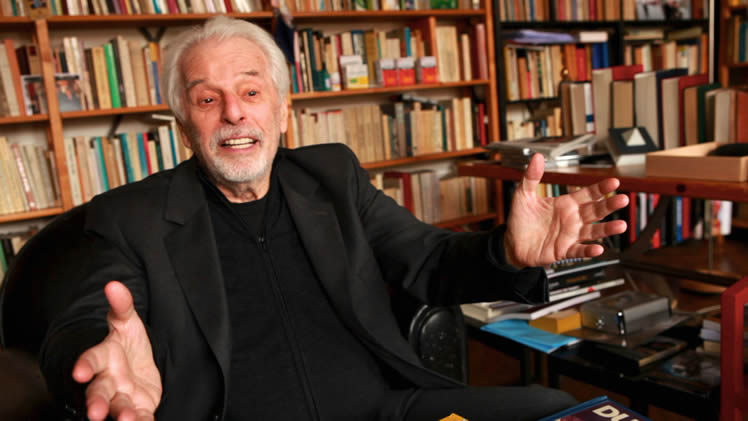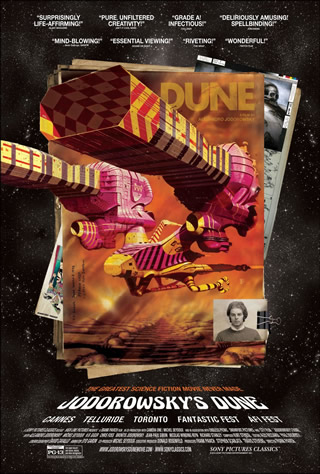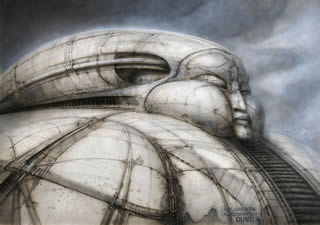Movies

New Releases • A-D • E-H • I-P • Q-Z • Articles • Festivals • Interviews • Dark Knight • Indiana Jones • John Wick • MCU

Alejandro Jodorowsky
Photo: Sony Pictures Classics
Jodorowsky's Dune
Directed by Frank Pavich
Rated PG-13
Spiked 9 May 2013
"You can't have a masterpiece without madness."
- Michel Seydoux
Alejandro Jodorowsky is a wingnut filmmaker who almost made a movie version of Dune back in 1975. This curiosity-piece documentary about that failed attempt is an interesting look at what might've been, but there are reasons to be skeptical of Jodorowsky's vision.
Pied Piper of Dune

Jodorowsky's Dune isn't quite on par with Lost in La Mancha, which details Terry Gilliam's painful attempt to film The Man Who Killed Don Quixote (by the way, it's once again in pre-production). No. Jodoworsky's attempt at Dune didn't face disasters and astonishing hurdles, apart from one debilitating act in the run-up to filming.
In fact, according to this documentary, much of the pre-production planning and cast assembling was extraordinarily serendipitous.
You want Mick Jagger to star as Feyd Rautha? Well how about that? He's at the same party. He says one word, "Yes." Getting Orson Welles to agree to play Baron Harkonnen was a bit trickier. That required gastronomic bribery, a promise to keep Welles' enlarging belly full of quality eats. And getting Salvador Dali as Emperor Shaddam IV turned into a game of mathematics. He wanted to become the highest paid actor of all time at the imperial sum of $100,000 per hour. Jodorowsky turned that into a counter-proposal of $100,000 per minute of screen time, which figured to be around 3-5 minutes. Dali catapulted himself at the offer.
Throughout much of Jodorowsky's Dune, Alejandro Jodorowsky comes across less as an artist and more as a high-minded cult leader without a bible. Following Jodorowsky's international success with El Topo and The Holy Mountain (in 1973, second only to Live and Let Die in Italy, it is noted), Jodorowsky's producer pal, Michel Seydoux, was ready to support the next project of Jodorowsky's choosing. For better or worse, he blurted out his response; he wanted to film Dune as an LSD trip, a way to gain popular support for the drug's use by recreating its effects on celluloid. Why Dune? Because a friend told him it was a great book. Jodorowsky hadn't even read it when he pitched his idea.
Dune Lunatic
While Jodorowsky goes on and on about his desire to collaborate with "spiritual warriors," he also notes how he procured the rights to Dune on the cheap because everybody figured it couldn't be done. Jodorowsky, it would seem, was also being unfair to the source material from jump street. What if he himself didn't find a spiritual connection to the book? He committed himself to his own LSD vision and applied it to a book he hadn't even read yet.
Movies, Jodorowsky asserts, are an art, not an industry; they're like painting, poetry and literature. Yet he very quickly added all-new elements to Herbert's work. How faithful was Jodorowsky prepared to be to the art of others? Questions like that are never asked, even as one person after another involved in the production admits to not having read the book.
It doesn't really help to have Richard Stanley (a director fired from the remake of The Island of Dr. Moreau years ago) and Nicolas Winding Refn (Drive and Only God Forgives), along with a couple too-young-for-context film critics, trumpeting this version of Dune as the greatest movie never made.
At least Gary Kurtz, the producer of Star Wars, provides a bit of a reality check. The studios simply didn't trust Jodorowsky with their money (and here it doesn't help having Jodorowsky pull out a wad of cash from his pocket and basically call it worthless shit). They wanted $15 million, somehow had access to $10 million, and needed Hollywood to chip in another $5 million. By way of comparison, the budget for Star Wars in 1977 was $11 million and the budget for Lawrence of Arabia in 1962 was $15 million.
After going through tremendous pains of detailed planning — including prepping Jodorowsky's son to play Paul Atreides by putting him through two years of intense physical training at the age of 12 — the intent was to assuage studio fears with extensive planning and a hefty book of detailed storyboards crafted by renowned artist Moebius. Dan O'Bannon, the effects meister on John Carpenter's Dark Star, H.R. Giger and Chris Foss would further flesh out the designs and stylings of Dune.
It wasn't enough.
Dune Legacy
Under normal circumstances, Jodorowsky's Dune would've faded into oblivion and simply been one more movie that never got made. There are loads of them out there. But a funny thing happened along the way to nothing: Jodorowsky pulled together some really noteworthy artistic talent. O'Bannon, Foss, Giger and Moebius (Jean Giraud) would all collaborate on Ridley Scott's Alien and some of their Dune design concepts would make their way into that and other projects.
This documentary goes on to assert, though, that the storyboards they seeded in every studio as part of their pitch have been bearing fruit for others for decades. Star Wars, Flash Gordon, Raiders of the Lost Ark and Masters of the Universe (yes, the Dolph Lundgren flop) all, allegedly, pinched designs and ideas from the Dune storyboards book. Stretching things a bit too far, Jodorowsky sees his ideas in Contact (1997) and other, more recent projects including Prometheus, the Alien prequel which logically relied on the work of its predecessor's designers.

Classic H.R. Giger art from Dune
Image: Sony Pictures Classics
How much is genuine pilfering and how much is coincidence is up for debate. To take the claims made here as gospel truth would be a mistake. This is a documentary bent on telling only one side of the story.
As for Jodorowsky, he was apparently too devastated by Hollywood's rejection to continue making films. So much for passion. Real passion should've risen above it and proved the studios wrong via other projects. Instead, Jodorowsky made three relatively unremarkable movies, Tusk, Santa Sangre and The Rainbow Thief (notably reuniting Peter O'Toole and Omar Sharif) during the next 38 years. This documentary proved enough of a catalyst for Jodorowsky and Seydoux to reunite on The Dance of Reality, Jodorowsky's first movie in 23 years.
Instead of making movies and proving himself time again (an unfortunate harsh bit of reality most artists come to terms with), Jodorowsky has spent a fair amount of time plundering his own Dune work, using it to feed a collection of unrelated graphic novels. While he suggests somebody should make an animated movie based on his storyboards, a more natural progression would be a full-blown graphic novel. Yet Jodorowsky hasn't pursued that angle, fueling this writer's skepticism of the quality of the underlying screenplay.
In the end, Jodorowsky seems like a safe bet for entertaining company during a trip to the ice cream shop, but anything more than that might prove to be unbearable. This documentary is worthwhile viewing for die-hard film buffs and film historians as well as Dune fans, but there's no palpable sense that the world is worse off for not having been given Jodorowsky's Dune.
Twin Dunes
Jodorowsky revealed the weakness of his own spiritual warrior by exhibiting schadenfreude in the failure of David Lynch's Dune. But how much different would his have been? Setting aside the exceptional design talent, there are plenty of similarities.
| Source Material | Frank Herbert | Frank Herbert |
| Screenplay | Alejandro Jodorowsky | David Lynch |
| Director | Alejandro Jodorowsky | David Lynch |
| Music | Pink Floyd, Magma | Toto |
| Baron Harkonnen | Orson Welles | Kenneth McMillan |
| Paul Atreides | Brontis Jodorowsky | Kyle Maclachlan |
| Emperor Shaddam IV | Salvador Dali | Jose Ferrer |
| Duke Leto Atreides | David Carradine | Jurgen Prochnow |
| Feyd Rautha | Mick Jagger | Sting |
• Originally published at MovieHabit.com.


